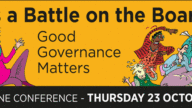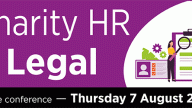Why there's more to ‘cc all’ than clogging up your inbox
Not being included in comms is the equivalent of sitting in a meeting with a paper bag over your head and ear plugs in.
I recently had a medical diagnosis which turned out to be wrong. This was partly because I hadn’t disclosed a family medical condition – not deliberately, but because I hadn’t known about it.
If I had, this would have triggered a number of tests which would have identified the problem early and I would have had the appropriate treatment in time.
Because neither I nor my doctor knew about it, I now have a permanent chronic condition which is incurable but could have been prevented if I had known about my family member’s condition.
They didn’t tell me for no other reason than it didn’t occur to them that it would be useful for me to know.
Reflecting on this unfortunate situation really reinforces for me the absolute need for trustees to share their questions and thinking about the charity’s activities with each other in between meetings.
And one of the simplest ways to do this is, at the very least, to ‘cc all’.
When I tell boards they should cc all in their communications with each other, the chair and the executive, I usually meet massive resistance.
Excuses usually run along the lines of: “I don’t want my inbox clogged up” or “I don’t want to clog up anyone else’s inbox”; “I’m not interested in that particular topic”; “It’s the chair’s job to decide what information we need”; “That’s the job of a committee I don’t sit on”; and so on.
But here’s the thing. As a trustee you are legally accountable for everything that goes on in the charity, regardless of whether you sit on any particular committee or if you didn’t know about it.
Ignorance doesn’t let you off accountability, I’m afraid.
Not being included in comms is the equivalent of sitting in a meeting with a paper bag over your head and ear plugs in.
You have no idea what your fellow trustees are thinking or talking about – and that’s not healthy when you are jointly accountable for the performance of the charity.
You don’t know what you need to know until you know it.
You and your fellow trustees are adults. You can choose how you manage email traffic.
Do not pass over to others the power to decide what you can and cannot know about the charity. Insist on being included.
Far too many trustees are put in the position of turning up at a board meeting having heard absolutely nothing from any other trustees or the exec since the last one.
So how can they be expected to be able to question and contribute constructively, from a position of being informed?
Because if information and thinking isn’t shared widely, you run the risk of your charity ending up with a chronic condition which would have been avoidable if you had shared your thoughts and views and been open to having others share with you.
Knowing what each other thinks gives the charity a better chance of staying healthy!
This article was originally published on the Third Sector website. Take a look here.


